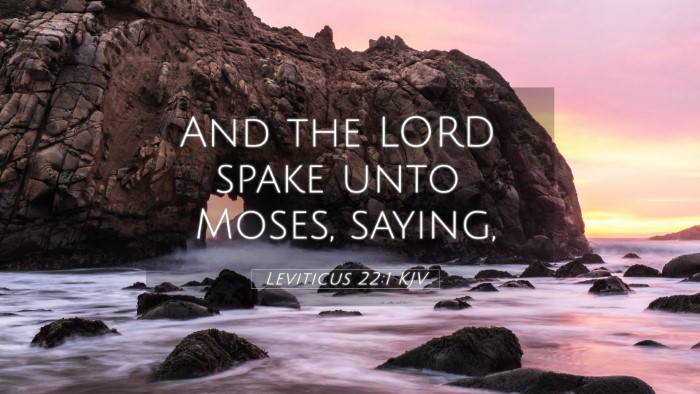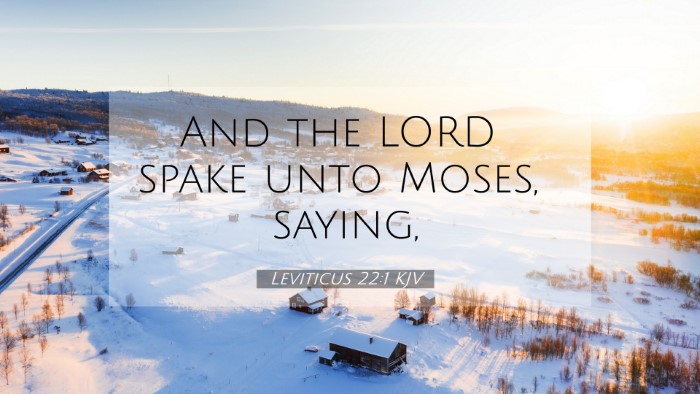Understanding Leviticus 22:1
Leviticus 22:1 states: "And the LORD spake unto Moses, saying," This verse serves as an introduction to God's instructions regarding the holiness and purity expected of the priests in their service to Him. In the broader context of Leviticus, this chapter addresses the sanctity of offerings and the restrictions placed on the priests who serve within the tabernacle.
Commentary Insights
- Matthew Henry: He emphasizes the divine origin of the instructions given to Moses, highlighting that God’s laws are not merely suggestions but commands meant to convey His holiness. It reflects the seriousness of maintaining purity in worship.
- Albert Barnes: Barnes notes that the directive signifies the separation God desires between the sacred and the profane. The priests, as intermediaries, must embody purity to adequately represent the people before God, underscoring their role in the sacrificial system.
- Adam Clarke: Clarke underscores the importance of God communicating directly with Moses, which serves to validate the authority of the laws that follow. He points out that the provisions concerning the priests are not only about their personal conduct but also about the collective worship of Israel.
Thematic Connections
This verse connects thematically with the holistic approach of God toward worship and purity. It sets a precedent that can be seen as a precursor to similar themes in both the Old and New Testaments, revolving around the concept of holiness, sacrifice, and service.
Cross-References
- Exodus 28:1 - Discusses the consecration of Aaron and his sons to serve as priests.
- Leviticus 10:3 - Highlights God's holiness and His demand for reverence among those who serve Him.
- Hebrews 7:27 - Underlines the perfection of Christ's priesthood, who does not require daily sacrifices like those of the Old Testament priests.
- 1 Peter 2:9 - Describes believers as a royal priesthood, extending the concept of holiness to all followers of Christ.
- Deuteronomy 33:10 - Speaks to the role of Levi and the priestly duties bestowed upon him and his descendants.
- Matthew 5:8 - Reminds that the pure in heart shall see God, reinforcing the idea of purity in worship.
- Romans 12:1 - Calls believers to present their bodies as living sacrifices, echoing the offerings mandated in Levitical law.
- James 1:27 - Emphasizes pure religion in caring for orphans and widows, demonstrating the practical implications of holiness.
- Revelation 1:6 - Notes that Christ has made believers to be a kingdom and priests, tying back to Levitical themes of service and dedication.
- Colossians 3:17 - Encourages a lifestyle of holiness in every action done in the name of the Lord, building on the call for purity in service found in Leviticus.
Application of Insights
Understanding Leviticus 22:1 through the lenses of these commentaries reveals several key takeaways:
- The necessity of recognizing God's holiness and reflecting that in our lives.
- The role that leaders and teachers play in guiding others toward a holy lifestyle.
- The thread of priesthood throughout the scriptures, connecting the old covenant with the new.
- The ongoing relevance of sacrificial themes and purity in the life of a believer today.
Tools for Further Study
For those interested in a deeper exploration of Leviticus 22:1 and related scriptures, consider using the following tools:
- Bible Concordance: A valuable resource for locating specific verses and themes throughout scripture.
- Bible Cross-Reference Guide: A tool to help find related passages across the entire Bible.
- Cross-Reference Bible Study: Methods and resources for effectively studying scripture in relation to its interconnectedness.
- Bible Reference Resources: Compilations of scripture that provide additional context and depth to biblical themes.
- Comprehensive Bible Cross-Reference Materials: Detailed guides offering thematic and contextual links between verses.
By engaging with these insights and tools, one can gain a broader and more profound understanding of Leviticus 22:1 and its implications not only within its immediate context but also in the scope of the entire biblical narrative. The connections between Bible verses enrich our understanding of God's character and His expectations for holiness from those who serve Him.


